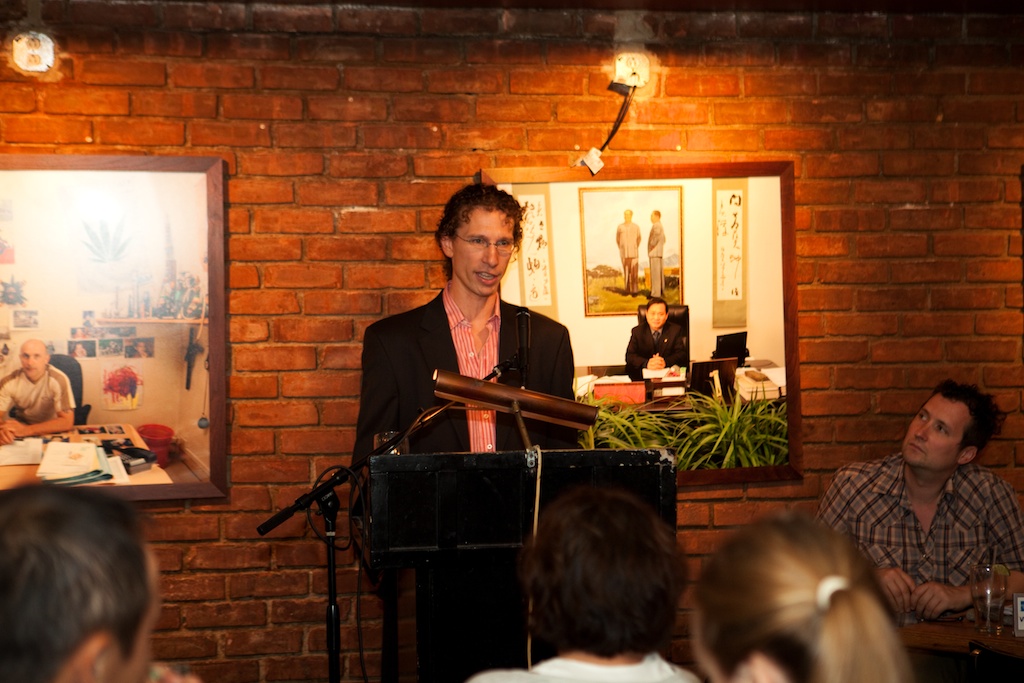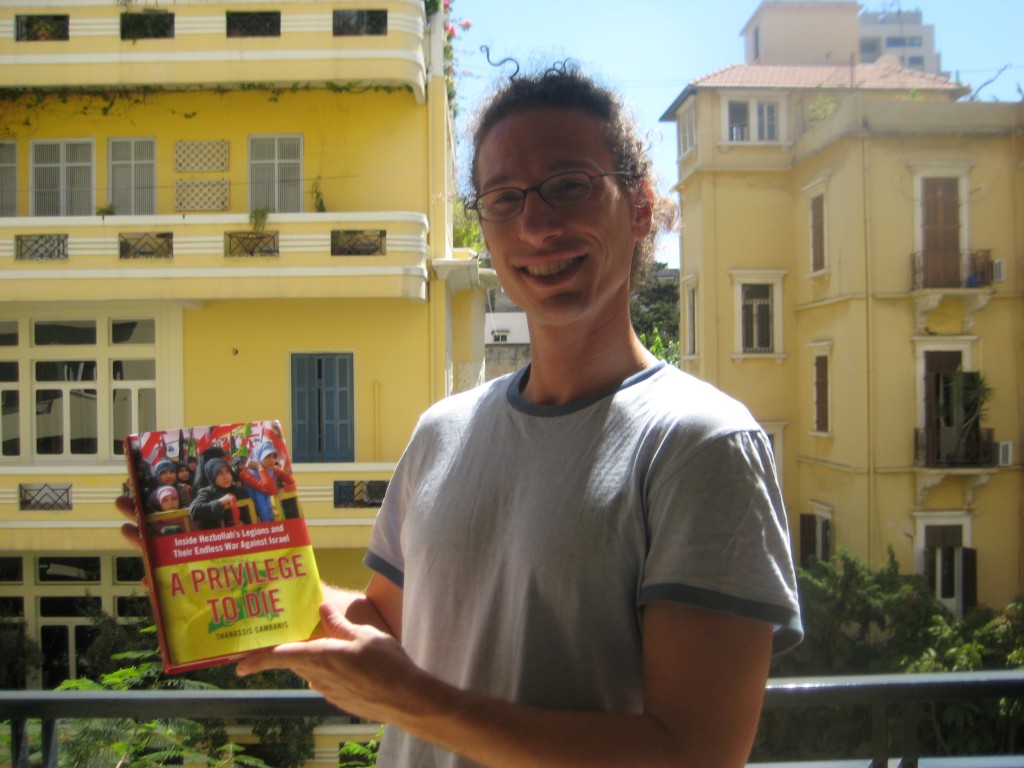Rapture, Resistance, Revolution
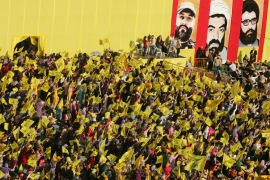 In his review of A Privilege to Die for Global Post my friend the mystery writer (and veteran Middle East hand) Matt Beynon Rees calls attention to one the main endeavors of the book: to place front and center the regular Joes and Janes (or Ranis and Farahs) that have elevated Hezbollah into a perennial and expanding trend-setting militant movement.
In his review of A Privilege to Die for Global Post my friend the mystery writer (and veteran Middle East hand) Matt Beynon Rees calls attention to one the main endeavors of the book: to place front and center the regular Joes and Janes (or Ranis and Farahs) that have elevated Hezbollah into a perennial and expanding trend-setting militant movement.
Hezbollah’s rank-and-file, the footsoldiers and volunteers, aren’t always scheming against Israel or dreaming of perpetual war; they’re also strivers looking for better jobs, education for their kids, and a more honest relationship with God.
Because of its growth and success on the battlefield, the Party of God itself often takes on mythic status. Outsiders sometimes impute far greater cunning, skill and sophistication to Hezbollah than its occasionally clunky and authoritarian behavior merits.
Matt re-tells one of the more amusing encounters I had with Hezbollah while reporting the book:
Unsatisfied with one of his stories, Hezbollah officials denied his book the cooperation of the Party of God (“Hizb” means party in Arabic; “Allah” you probably heard of already.) He describes one party functionary telling him, “‘You can’t possibly write a book about Hezbollah without the party’s permission, right? You’ll have to move on to another project?’ Like many Hezbollah officials she overestimated the party’s ability to control or manipulate a foreigner like me and she thought the prospect of future access would tempt me to relinquish writing this book.”
Carolina homecoming
 No, not that kind of homecoming.
No, not that kind of homecoming.
I’m returning to my old stomping grounds this week to visit my mother and while I’m at it, to talk about Hezbollah in Chapel Hill, Durham and Fearrington Village. These appearances complete a circle.
The last time I was in Chapel Hill as a working journalist was in 1996, as editor of The Daily Tar Heel, muckraking about developers, the BCC, the mayor’s race, NIMBY soccer moms, and “town-gown relations” (who came up with that horrifying cliche?).
Now I’m back doing the same thing, at somewhat greater length and I hope with a sharper capacity to entertain. The subjects aren’t all that different: Islamism, guerilla war, Middle Eastern politics, NIMBY soccer moms, and “Arab-Israeli relations.”
7 p.m., Thursday, Oct. 7, Flyleaf Bookshop, Chapel Hill.
7 p.m., Friday, Oct. 8, Regulator Bookshop, Durham.
11 a.m., Saturday, Oct. 9, McIntyre’s Fine Books, Fearrington Village.
Tribunal bedeviling Hezbollah
 In the kind of notoriety that really excites a geek like me, my favorite blogger on Lebanon has interviewed me about A Privilege to Die. Qifa Nabki talked to me about what it is, exactly, that I’m writing and arguing about Hezbollah, and delves into some of his favorite topics – like Hezbollah’s influence on the wider Arab world and the social-ideological recipe that distinguishes Hezbollah from other mass-mobilization Islamist movements.
In the kind of notoriety that really excites a geek like me, my favorite blogger on Lebanon has interviewed me about A Privilege to Die. Qifa Nabki talked to me about what it is, exactly, that I’m writing and arguing about Hezbollah, and delves into some of his favorite topics – like Hezbollah’s influence on the wider Arab world and the social-ideological recipe that distinguishes Hezbollah from other mass-mobilization Islamist movements.
He asks how Hezbollah might respond if the International Special Tribunal investigating the 2005 murder of former Lebanese Prime Minister Rafik Hariri were to indict some Hezbollah members.
During my reporting trip to Lebanon in September I was surprised by Hezbollah’s uncompromising position on this issue. Party officials whom I interviewed echoed their leader Hassan Nasrallah’s absolutist stance: Hezbollah wouldn’t turn over any members, Hezbollah wouldn’t even recognize the Tribunal’s authority, and Hezbollah would ask the rest of the Lebanese government to adopt Hezbollah’s position.
If Hezbollah sticks to its guns on this issue, so to speak, it could quickly escalate into internal violence. During the crisis from 2006 to 2008, Hezbollah could argue that it was willing to negotiate so long as the other political parties in Lebanon were willing to give Hezbollah the one-third of power it was due demographically and by its share of seats in parliament. In the event of a Tribunal indictment of Hezbollah operatives, however, Hezbollah will find itself in a complicated position. If the indictment presents compelling evidence, Hezbollah will find its pure image substantially tarnished. And if Hezbollah is willing to withdraw from the government and go to war against it, rather than surrender any indicted members, it will risk alienating a broad segment of the Lebanese public that until now has supported Hezbollah’s Islamic resistance project, or at least, not stood in its way.
PTD in DC Sunday
I’ll have two public events in Washington, DC. If you’re in the area, I’d love to see you at either one. I’ll report back here on the Elliott Abrams panel, which will be live webcast at the CAP website.
5 p.m., SUNDAY, October 3: Politics & Prose (5015 Connecticut Avenue NW).
12 p.m., Thursday, September 30: Center for American Progress (1333 H Street NW). Brian Katulis moderates a discussion between me an Elliott Abrams from the Council on Foreign Relations.
NBC’s Today Show visits Mleeta
On Friday morning, I appeared on NBC’s Today Show in this spot on the Hezbollah park in Mleeta. The show visits Hezbollah’s new theme park about the Islamic resistance, the first permanent Hezbollah museum/tourist attraction.
NYT reviews PTD
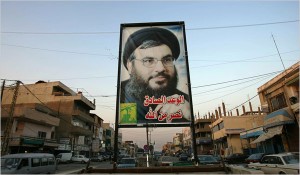 Just posted, Joe Klein’s review in The New York Times Book Review.
Just posted, Joe Klein’s review in The New York Times Book Review.
Klein opens his review, entitled “The Hezbollah Project,” recounting an episode from the book about Hezbollah’s seamlessly-run intake shelter in a Beirut parking garage, to receive people fleeing the war in south Lebanon.
A metaphor, of course: Hezbollah has created a national bomb shelter in the southern half of Lebanon. Its followers are fed and cared for, and they are devoted in a cultlike way, even though many have lost family members, homes and their livelihoods because of Hezbollah’s foolish bellicosity. It is a perverse triumph. Cambanis argues, persuasively, that Hezbollah represents the most successful radical Islamist movement in the region. He also tells a story that hasn’t been told with this much attention to detail by a Western reporter before.
It’s quite a complimentary review, despite a late jab at some repetitive phrasing in chapter 1 (my commissioning editor takes full responsibility for not catching and scrubbing those early passages!).
CSM reviews PTD
Rayyan Al-Shawaf reviews A Privilege to Die in the Christian Science Monitor. He writes:
In 2006, Hezbollah launched an unprovoked attack on Israel, which retaliated massively. This war and its aftermath set the stage for the author’s searching probe into the hearts and minds of Hezbollah’s rank and file. In prose that is often eloquent yet earthy, indicative of scholarly erudition as well as a storyteller’s flair for capturing the complexities of human psychology, Cambanis describes the seemingly contradictory impulses he discovers. Consider the case of 20-something Aya Haidar, who longs for martyrdom – preferably in the throes of the soon-to-return Mahdi’s (Messiah’s) war against infidels – but simultaneously wants to marry the man she loves and start a family. Observes Cambanis: “She was a Mahdist, a Hezbollah cadre, a schoolteacher fresh out of college, and a young girl in love, rolled into one bristling ball of energy.”
He goes on to argue that the book underestimates the scope of Shia dissatisfaction with and Sunni fury toward Hezbollah, a “chink in the party’s armor” that suggests Hezbollah has at most one more war left in it. I think Rayyan (whom I don’t know personally) is right to call attention to the growing frustration with Hezbollah. On my most recent reporting trip to Lebanon in September, I found the country more polarized than ever: Hezbollah’s supporters bristling, and its detractors less sympathetic than ever toward the Party of God’s militarism.
What we can’t predict is whether another war will conclusively diminish Hezbollah, as Rayyan writes, or whether it will once again restore the party’s luster and dominant position, as it did after the 2006 war, to the surprise of so many people.
Elliott Abrams, Hezbollah and my book
I plan to write about the moderated conversation with Elliott Abrams, Brian Katulis and me on Thursday, but I wanted immediately to put up the video of the event, from the Center for American Progress website. You can watch it below or on their site.
The Half King
Monday night marked my first public presentation as a published author. Lots of friends, family, former students, and even a healthy contingent of people I’ve never met came to the Half King in Chelsea to hear about A Privilege to Die. We sold out of books, and one of my standout graduate students informed me that when I talk about Hezbollah “it’s a hell of a lot more interesting than hearing you talk in class.”
Thanks to everyone who came.
New York book debut continues tonight!
A Privilege to Die officially releases today. (Yesterday was the soft launch.) If you’re in the area, I hope you can make it:
7 p.m., Tuesday, September 28: Barnes & Noble, Upper West Side (82nd and Broadway). I’ll talk about the book and take questions.
7 p.m., Monday, September 27: The Half King Bar & Restaurant (505 W. 23rd St.). Eat, drink and ask questions about the book. We’ll stay afterward and enjoy the bar’s offerings.
First look at the book
A UPS courier woke me up this morning in Beirut with some pre-publication copies of A Privilege to Die — my first look at the actual book. Odysseas had shown me a copy on g-chat yesterday of “Baba’s book,” but the feeling was complete when I held a physical copy in my hands of this project that has been four years in the making. Here I am on Borzou and Delphine’s balcony in Ashrafieh, outside the borrowed office where I typed up so many of the early notes that fed into the story.
PTD in Albuquerque
I’ll be in Albuquerque on Oct. 24 talking about Hezbollah and A Privilege to Die. Diane Schmidt published an interview with me in the Albuquerque Examiner.
Quoted in Le Figaro
Delphine Minoui quotes me in her story in Le Figaro about Hezbollah’s museum in Mlita.
«Mon cœur bat pour le Hezbollah», s’extasie, ce jour-là, une mère de famille venue de Beyrouth, tandis qu’elle contemple une vaste carte détaillant les cibles potentielles en cas de nouveau conflit: aéroport Ben-Gourion à Tel-Aviv, gares ferroviaires, centrales électriques… À quelques mètres de là, des bambins de 3 ans se font photographier devant des roquettes. «Le Hezbollah est parvenu à insuffler une culture de la victoire auprès de ses sympathisants, quels que soient ses résultats sur le champ de bataille», observe le journaliste américain Thanassis Cambanis, dont le nouveau livre, A Privilege to Die (Free Press), s’intéresse à la machine de propagande du Parti de Dieu.
Kirkus Reviews on PTD
Kirkus Reviews published a review of A Privilege to Die on August 1.
If there’s anything to unite the Arab world, it’s opposition to Israel. If there’s a group to do that unifying, writers former Boston Globe Middle East bureau chief Cambanis, it’s the much-feared Hezbollah, the Party of God.
Hezbollah, writes the author, makes for a complex, frightening enemy that has “put back into popular currency a notion that had lain in tatters since 1967: that Arab forces could do more than terrorize or harass Israel—they could defeat and destroy it. That promise of quick resolution, paradoxically, follows a long and patient process of outwaiting its Israeli foe, slowly building a unified, militant front and sniping at the edges, though unafraid to take on the full might of the Israeli Defense Forces, as in the short-lived but brutal Lebanon war of 2006. Centered in Lebanon but with ties to Iran and Syria, Hezbollah owes much of its success to its secretary general, Sayyed Hassan Nasrallah, who, writes the author, “commands more popularity in the Middle East than any other leader.” Nasrallah has taken his organization from the fringe to the center of regional politics, both as an army and as a political force, offering followers a “heady mix of religion, self-improvement, and self-defense that translated into a sustained wave of toxic and powerful militancy.” That militancy is expressed in suicide bombings and other acts of terror, but Cambanis does not sensationalize. Such things are mere tactics, but if Hezbollah is on the whole less anti-Semitic than rival Arab groups, that does not lessen its irrevocable commitment to destroy Israel even as it is “willing to negotiate most other issues” in the interest of practical politics, a stance that gives it a veneer of respectability in the tumult of regional power struggles.
Hezbollah is a formidable presence that cannot be ignored, and Cambanis’s book, a well-balanced blend of journalism, history and geopolitical primer, is a significant aid to understanding it.
Publisher’s Weekly starred review
My first official critical feedback came in today from the trade magazine Publisher’s Weekly, which gave A Privilege to Die a starred review.
Publisher’s Weekly
Posted June 28, 2010
Starred ReviewA Privilege to Die: Inside Hezbollah’s Legions and Their Endless War Against Israel
Thanassis Cambanis, Free Press, $27 (304p) ISBN 978-1-4391-4360-5
American journalist Cambanis has spent much of the last decade observing the Middle East from within its most intractable struggles, most notably while on the front lines of Israel’s 2006 war with Hezbollah. The extremist Shi’ite organization is notorious for not granting high-level access to Western journalists and for tightly controlling whatever lower-level representatives might say, but Cambanis spent three years getting past the script “to write with humanity about reviled characters.” Interviewing fighters in the field, nurses tending to the wounded, refugees on the road, and think-tank pundits enabled him to probe the real motivations, histories, and ambitions of Hezbollah’s followers and better understand their devotion to “war without end” and an “ideology designed to rebound and flourish under assault.” As such, Cambanis provides crucial insights to those who might hope to counter Hezbollah’s increasing power and influence in the region, as well as an important reminder that in any war, one’s enemies are human. (Sept.)
A new Hamas book
 I’m looking forward to reading Hamas: The Islamic Resistance Movement, the new book by friend and colleague Steve Farrell, who worked with expert Beverley Milton-Edwards for many years before its release. I’ve learned enormous amounts about Hamas in conversation with Steve, who is an indefatigable shoe-leather reporter and has been covering the region for longer than most of us have even been paying attention.
I’m looking forward to reading Hamas: The Islamic Resistance Movement, the new book by friend and colleague Steve Farrell, who worked with expert Beverley Milton-Edwards for many years before its release. I’ve learned enormous amounts about Hamas in conversation with Steve, who is an indefatigable shoe-leather reporter and has been covering the region for longer than most of us have even been paying attention.
(Matt Rees reviewed the book on Global Past and kindly mentioned A Privilege to Die.)
Publisher’s Summary
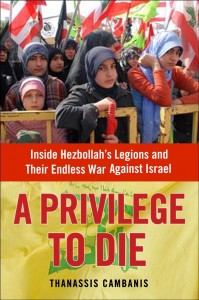 A PRIVILEGE TO DIE: Inside Hezbollah’s Legions and Their Endless War Against Israel.
A PRIVILEGE TO DIE: Inside Hezbollah’s Legions and Their Endless War Against Israel.
In the tradition of Thomas Friedman’s From Beirut to Jerusalem, journalist Thanassis Cambanis explains why Hezbollah has emerged as the premier threat to both Israel and the West.
How has Hezbollah, which has now won two wars with Israel, managed to become the most powerful movement in the Islamic world, why has it gained millions of followers, and what do they want? Part standing army, part political party, and part theological movement, Hezbollah has created a revolution in the Middle East and is uncompromising in its intentions to remake the map of the Middle East and destroy Israel. Veteran Middle East correspondent Thanassis Cambanis offers the first detailed look at the surprising cross section of people who are willing to die for this movement: not just unemployed young men, but middle-class engineers, merchants, even nurses. While Hamas and al Qaeda are certainly dangerous to Israel and the West, it is Hezbollah’s millions of foot soldiers—who span economic class and religious sect—sworn to the group’s apocalyptic beliefs that have made it the premier force in the Middle East. Through vivid portraits of the men and women who do Hezbollah’s grassroots work—on the battlefields, in politics, in nightclubs, and with scout troops—Cambanis introduces us to the “soccer moms” of Hezbollah, the rank-and-file devotees steeped in a fiery new brand of Islam and puts a human face on the movement that has ushered in a militant renaissance and inspired fighters in Gaza, the West Bank, Egypt, Iraq, and beyond. A Privilege to Die is an urgent and important exploration of militancy in the Middle East.
EARLY REVIEWS
“Brilliant and revealing. It positively frightened me. Cambanis tells an important story with emotional power.”
–Leslie H. Gelb, President Emeritus of the Council on Foreign Relations
“A Privilege To Die is a revelation. Thanassis Cambanis, one of the most talented foreign correspondents of his generation, has traveled far into the heart of Hezbollah and what he has found there needs to be read about and studied by general readers and policy-makers alike. His reporting is not only fearless but sophisticated and penetrating, providing us with a vibrant image and unprecedented understanding of this powerful and secretive Islamist force. A Privilege To Die will become required reading for anyone who hopes to understand Lebanon and the modern Middle East.”
— Matthew McAllester, Pulitzer Prize-winning author of Bittersweet: Lessons from my Mother’s Kitchenand Blinded by the Sunlight: Surviving Abu Ghraib and Saddam’s Iraq.
“A gripping, street-level view of Hezbollah. Cambanis brings Hezbollah out of the shadows to show how it has become the world’s most sophisticated resistance group.”
— Richard Engel, Chief Foreign Correspondent, NBC News, author of War Journal and A Fist in the Hornet’s Nest.
“No global flashpoint today is more important than the Hezbollah-Israel conflict, and no book I know does a better job than A Privilege to Die in getting inside the thought-world of Hezbollah’s followers. From the front-lines of southern Lebanon, Cambanis brings us the human voices of fighters whom he gets to know even before they become martyrs for the cause. Their stories show the importance of faith and belief in making sense of violence. Nuanced, textured, and brutally honest, the book should be required reading for anyone who cares about war and peace in the Middle East.”
— Noah Feldman, Harvard Law School, author of Scorpions: The Battles and Triumphs of FDR’s Great Supreme Court Justices and The Fall and Rise of the Islamic State
“Illuminating and terrifying in equal measure. Thanassis Cambanis journeyed to the heartland of the most important, least understood armed actor in the Middle East. The souls he met along the way are rendered with compassion but not spared the same unflinching lens that Cambanis turns on his own biases. This will be a controversial book, and an important one.”
— Quil Lawrence, National Public Radio Kabul Bureau Chief, author of Invisible Nation: How the Kurds’ Quest for Statehood Is Shaping Iraq and the Middle East
“A refreshing and insightful journey into a one of the most complex dynamics in the modern Middle East. Thanassis Cambanis combines extraordinary reportage with sharp analysis and a clear voice to explore the many sides of Hezbollah, from militant group to political party and charity organization. A series of highly evocative portraits of the people who make up the core supporters of Hezbollah makes A Privilege to Die a must read for anyone who seeks a better understanding of the region and its people.”
— Farnaz Fassihi, The Wall Street Journal, Author of Waiting for an Ordinary Day
PUBLICATION INFORMATION
A Privilege to Die
September 2010
Free Press
Political Science
6 x 9, 304 pages
ISBN: 978-1-4391-4360-5
$27.00 / $34.99 in Canada
Book Coming
Free Press has settled on a title for my forthcoming book. It’ll be called A Privilege to Die: Inside Hezbollah’s Legions and Their Endless War Against Israel. It should be in bookstores this fall.
